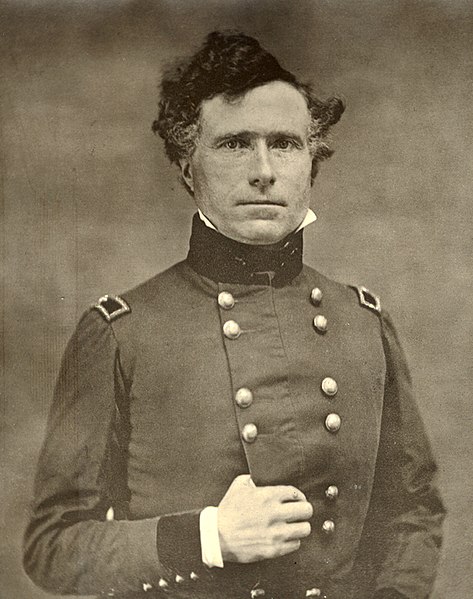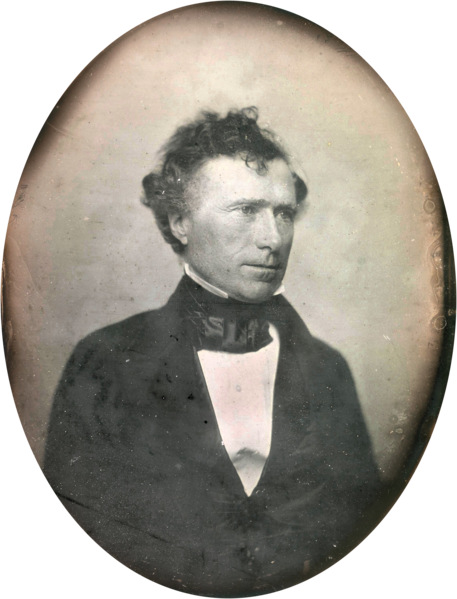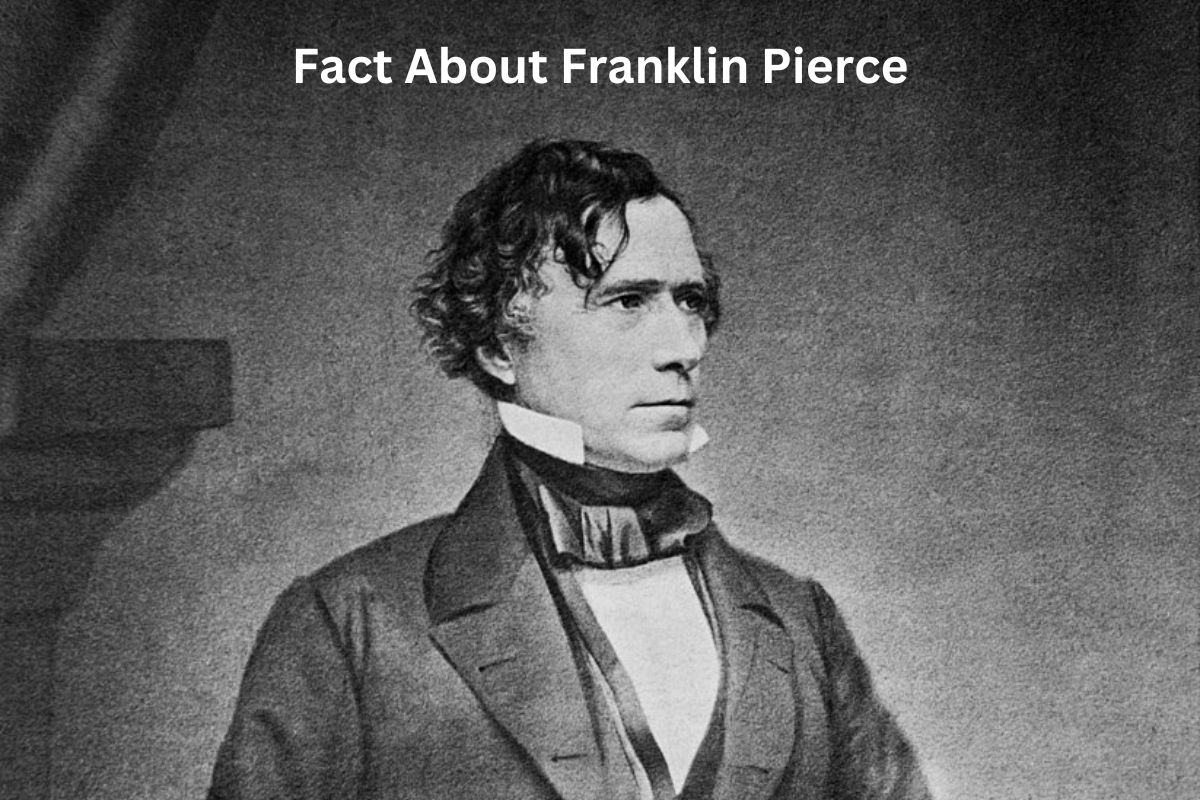Franklin Pierce (1804-1869) was the 14th President of the United States, serving from 1853 to 1857. He was born in Hillsborough, New Hampshire, and had a noteworthy military career during the Mexican-American War.
Pierce’s presidency was marked by his pro-Southern stance on slavery, the passage of the controversial Kansas-Nebraska Act, and his support for the Fugitive Slave Act.
Despite his initial popularity, his time in office was fraught with political turmoil, and he chose not to seek re-election.
After leaving the presidency, Pierce retired from politics and faced personal tragedies. He passed away in 1869, leaving a mixed legacy in American history.
Franklin Pierce Facts
1. Born on November 23, 1804, in Hillsborough, New Hampshire
Franklin Pierce was born on November 23, 1804, in Hillsborough, New Hampshire, in a small log cabin. He was the son of Benjamin Pierce, a Revolutionary War veteran and prominent state politician.
Also Read: Franklin Pierce Accomplishments
Growing up, he received a private education and later attended Bowdoin College in Maine, where he graduated fifth in his class.

2. Served as a brigadier general in the Mexican-American War
Franklin Pierce’s military service played a significant role in his political career. During the Mexican-American War (1846-1848), he volunteered and served as a brigadier general in the United States Army.
His leadership in the Battle of Contreras and the Battle of Churubusco earned him recognition and praise. However, his time in the military also exposed him to the harsh realities of war and its toll on soldiers.
3. Faced personal tragedies, including the loss of his children and his wife’s illness
Franklin Pierce’s personal life was marked by a series of tragedies. In particular, he and his wife, Jane Means Appleton Pierce, faced immense sorrow. They had three children, all of whom died at a young age.
Their first child died shortly after birth in 1836, their second child died of typhus at the age of four in 1843, and their third child, a son named Benjamin, died in a tragic train accident just a few days before Franklin Pierce’s inauguration as President in 1853.
Additionally, Jane Pierce suffered from chronic illness and depression, which made her reluctant to take on the role of First Lady during her husband’s presidency. These personal hardships undoubtedly had a profound impact on Franklin Pierce’s life and presidency.
4. Elected as the 14th President of the United States in 1852
Franklin Pierce was a “dark horse” candidate for the presidency. He was not a well-known national figure and was relatively obscure in American politics at the time.
His nomination as the Democratic Party’s candidate in the 1852 presidential election came as a surprise to many. Pierce’s nomination was the result of a contentious Democratic National Convention where more prominent candidates failed to secure the necessary support.
His relative obscurity was seen as an advantage, as he was seen as a compromise candidate who would avoid inflaming sectional tensions over slavery.

5. Known for his pro-Southern stance on slavery
Pierce’s presidency was marked by his pro-Southern stance on the issue of slavery. He supported the expansion of slavery into newly acquired territories and states, which exacerbated tensions between the Northern and Southern states.
His administration’s policies, including the enforcement of the Fugitive Slave Act and the passage of the Kansas-Nebraska Act, contributed to the deepening divide between the North and the South in the years leading up to the American Civil War.
6. Oversaw the passage of the Kansas-Nebraska Act in 1854
One of the most significant events during Franklin Pierce’s presidency was the passage of the Kansas-Nebraska Act in 1854. This act allowed the residents of the Kansas and Nebraska territories to decide for themselves whether to allow slavery within their borders, a concept known as “popular sovereignty.”
The act effectively repealed the Missouri Compromise of 1820, which had prohibited slavery in the northern territories. The passage of the Kansas-Nebraska Act led to violent clashes and “Bleeding Kansas” as pro-slavery and anti-slavery settlers vied for control of the territory.
It also further polarized the nation along sectional lines, contributing to the outbreak of the American Civil War just a few years later. Franklin Pierce’s support for this act is often criticized as a significant factor in the lead-up to the Civil War.

7. Negotiated the Gadsden Purchase during his presidency
During Franklin Pierce’s presidency, the United States negotiated the Gadsden Purchase in 1853. This purchase involved acquiring a strip of land, primarily in what is now southern Arizona and New Mexico, from Mexico.
The purpose of this acquisition was to secure land for the construction of a southern transcontinental railroad route, which was seen as strategically important for connecting the eastern and western coasts of the United States.
The Gadsden Purchase was named after James Gadsden, the U.S. Minister to Mexico, who negotiated the treaty. This land acquisition helped set the stage for the development of transportation infrastructure in the American Southwest.
8. Supported the Fugitive Slave Act and opposed abolitionists
Franklin Pierce supported and signed into law the Fugitive Slave Act of 1850 during his presidency. This law required the return of escaped slaves to their owners, even in states where slavery was illegal.
It was highly controversial and deeply unpopular in the Northern states, where many opposed the institution of slavery. The Fugitive Slave Act further fueled tensions between the North and the South and contributed to the growing divide over slavery in the United States.
9. Chose not to seek re-election in 1856
Franklin Pierce’s presidency was marked by political turmoil and deepening sectional divisions. His pro-Southern policies and the controversy surrounding the Kansas-Nebraska Act eroded his popularity in the North.
In light of these challenges, Pierce chose not to seek re-election in the 1856 presidential election. Instead, James Buchanan was nominated as the Democratic Party’s candidate and went on to win the presidency.
10. Died on October 8, 1869, in New Hampshire
After leaving office in 1857, Franklin Pierce retired from politics and returned to his home state of New Hampshire. He spent his post-presidential years in relative obscurity. Pierce continued to be affected by personal tragedies, including the loss of his wife, Jane, in 1863.
He died on October 8, 1869, in Concord, New Hampshire, at the age of 64. His death marked the end of a turbulent chapter in American history, as the nation moved closer to the outbreak of the American Civil War, which would occur just a few years after his presidency.
